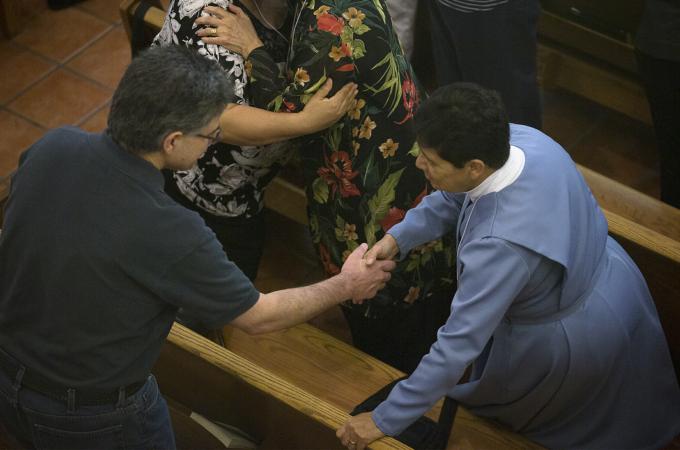Gone viral
I'm sure I'm not the only one watching the daily corona virus maps and I know I'm not the only one buying an extra bottle of hand sanitizer at the grocery store. It's frightening to see an illness we don't know how to cure or prevent spread. And it's very sad to hear the rising number of deaths caused by the disease worldwide, especially among the elderly and those who already face significant health challenges.
For me, the whole thing underscores the fact that none of us lives in a vacuum. We pass things to others and catch things from others every day. But the good news is that all kinds of things -- not just dangerous ones -- spread. Goodness and mercy, truth and justice, beauty and joy spread, too.
Faith in Jesus Christ spread from the hotspots of Jerusalem, Corinth, and Rome to the ends of the earth. I imagine that a first- or second-century map of the spread of Christianity in the known world might have looked a lot like what we are seeing on the news. The same could have been said in later centuries when the map expanded to the Americas and the Far East.
It has been said that faith is more "caught" than "taught." The strange thing is that in every age, faith in Christ is caught in a manner somewhat analogous to how infections are contracted, that is: contact with someone who has it. We may not know exactly who the carrier was, or how the contact occurred. It can be indirect rather than direct contact, but it's always person to person.
And maybe that's why we don't see the Gospel spreading the way corona virus is. No one can come to faith in Jesus Christ without person-to-person contact, and that sometimes seems like the one thing we Christians today seem unwilling to do. The truth is that word gets around fast -- if only we're willing to speak up. But, to a whole lot of us, that's the problem. We don't want to open our mouths because we are afraid of being socially quarantined. And yes, that fear is not groundless.
But there is a whole other demographic when it comes to passing on the faith: those who have been "inoculated" against it. Maybe I'm pushing the analogy too far? I don't think so, and here's why. Vaccines work by stimulating a person's own immune system to attack a particular disease. They do this by injecting a weakened or dead virus into a person. It's just enough exposure to the illness to stir the body's natural defenses against it.
So, what do we think happens to a person who is exposed to faith that is "weak" or "dead?" You guessed it; they're likely to adopt a been-there-done-that attitude of inoculation. They will have seen enough to believe that they have seen it all. They will have learned enough to think they know everything there is to know about faith in Christ.
But what they would not have witnessed is living faith in action, the possibility of a personal relationship with God, and ongoing conversion that leads to genuine transformation. Those are the things that are up to each one of us to show the world, person to person and one at a time.
This Lent, as the world's attention is focused on the very real threat of the new coronavirus, don't quarantine your faith. Live in a way that spreads the Gospel to all you encounter. Wash your hands, but take off your mask. Meet people where they are with the God you know and love. Show them what God can do for them by sharing what he's done for you. Do not be afraid. Let faith in Jesus Christ spread to every human heart.
- Jaymie Stuart Wolfe is a Catholic convert, wife, and mother of eight. Inspired by the spirituality of St. Francis de Sales, she is an author, speaker, and musician, and serves as a senior editor at Ave Maria Press. Find Jaymie on Facebook or follow her on Twitter @YouFeedThem.



















